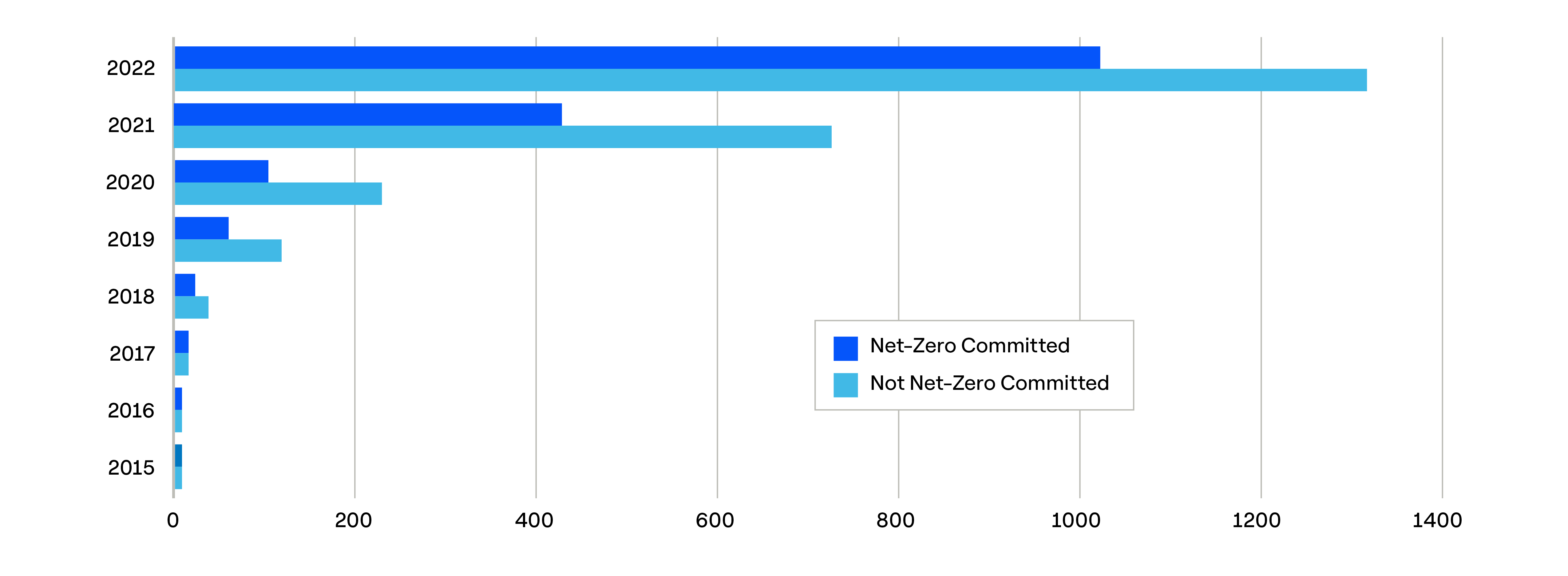In the absence of sufficient global progress on climate change mitigation, the private sector in North America is driving growing expectations for action. Investors, customers, and employees are increasingly demanding that organizations operate in a more sustainable manner. In response, organizations are setting ambitious targets to reduce their carbon footprint, increasing their use of sustainable energy sources, and improving their supply chain practices. Take a look at how this trend will transform the energy space going forward – and what it means for your organization.
With climate action expected from the private sector, there is a growing interest in science-based, net zero, and Scope 3 targets
Ongoing threats from a rapidly changing climate have not just underscored the growing need for energy resilience – they have raised sustainability awareness as well. Although progress from international collaboration has been limited, governments in the United States and Europe have introduced vast incentive packages to breathe new life into the clean energy transition and support their economies. In response to stakeholder pressure to become more sustainable while taking advantage of opportunities presented by new legislation, more organizations are setting decarbonization targets and looking for ways to make an impact.
The number of organizations working with the Science-Based Targets initiative (SBTi) to reduce their emissions in line with climate science has been growing exponentially since its inception in 2015. Both 2021 and 2022 were record years for the SBTi, as the number of organizations setting and committing to set science-based targets doubled at the end of those years. As of January 2023, more than 4,200 organizations of various sizes and industries were working with the SBTi, representing about half of the global economy in market capitalization.
Number of organizations working with the SBTi

Source: https://sciencebasedtargets.org/companies-taking-action
Net zero momentum is building, with organizations committing to cutting carbon emissions to as close to zero as possible. Accenture reports that more than a third of the world’s largest organizations have a public net zero target – a 7% increase since the end of 2021. Organizations committed to net zero are generally proactive in their approach to decarbonization, setting near-term targets in addition to the longer-term ones. They are developing actionable strategies, including a transition to clean power. The proliferation of net zero ambitions is behind an increasing focus on value chain emissions reductions, known as Scope 3 under GHG Protocol.
For many industries, the largest sources of emissions lie upstream or downstream of core operations – about 75%, according to the 2022 report released by CDP. It is not surprising, then, that more organizations see Scope 3 targets as instrumental for reducing emissions at the necessary pace and scale. And while supply chain emissions are challenging to address because they are driven by activities beyond an organization’s direct control, there is a lot of interest in working with suppliers to tackle Scope 3 emissions. Organizations can collaborate with their suppliers to share best practices, change procurement standards, or collectively procure renewable energy.
A recent move by McDonald’s and their logistics partners is a unique example of such collaboration. The restaurant chain and the five members of their North American Logistics Council signed VPPAs for 189 MW from Enel North America’s Blue Jay Solar project, expected to cover 100% of the company’s U.S. supply chain’s electricity load with renewables. Large organizations often advise their suppliers on their carbon emissions reductions. However, McDonald’s went beyond best practice sharing and became the anchor buyer alongside their suppliers. This renewable energy aggregation represents how a joint effort is key to meeting decarbonization targets.
Organizations are looking beyond decarbonization to ensure that they invest in sustainable energy sources
Mounting stakeholder scrutiny has prompted organizations to take a deeper look at their practices and procurement functions to make them more sustainable. Corporate energy buyers are increasingly realizing that renewable energy projects can have positive non-financial impacts in the communities where they operate. As a result, they are looking beyond transactional elements, such as the quantity and cost of renewables. They want to see that the clean energy projects they select can solve a wide range of issues beyond generating clean electricity, reducing costs, and lowering carbon emissions.

Bare Honey initiative at Enel’s Aurora solar project in Minnesota. Enel’s dual solar plants produce clean energy and are also important for pollinators, wildlife, and water-quality improvements.
When evaluating renewable energy projects and picking an energy partner, commercial and industrial organizations want to ensure that they procure from truly sustainable energy sources. To this end, they are starting to include environmental and social criteria in the procurement process. Such criteria can include:
- Land use and wildlife protection
- Management and circularity of developer materials
- Economic development in local communities
- Ensuring a just transition
- Air and water quality
- Diversity, equity, and inclusion (DE&I)
- Energy access
- Grid modernization and resilience
What does this mean for organizations investing in clean energy and sustainability solutions?
Growing stakeholder expectations for climate action is a key trend shaping the energy landscape in 2023. It is a major concern for organizations and as a result, they will ramp up their sustainability efforts. Science-based targets will become the bare minimum and investments in renewable energy solutions will continue to rise.
To learn more about the kind of clean energy solutions companies will pick and the type of track record they will demand from their suppliers, read our eBook, Top 5 Energy Trends in 2023.

